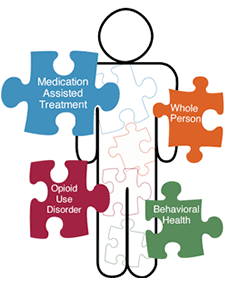It can't be cured, but it can be managed with treatment. Other examples of persistent illness include asthma, diabetes, and cardiovascular disease. It is important that treatment all at once addresses any co-occurring neurological or psychological disorders that are known to drive susceptible people to experiment with drugs and end up being addicted in the first location.
3 Studies released in top-tier publications like The New England Journal of Medication support the position that dependency is a brain disease. 4 An illness is a condition that changes the way an organ functions. Addiction does this to the brain, altering the brain on a physiological level. It actually changes the way the brain works, rewiring its fundamental structure.
Although there is no cure for dependency, there are many evidence-based treatments that are effective at managing the illness. Like all persistent health problems, addiction requires ongoing management that might include medication, treatment, and way of life change. As soon as in recovery from compound usage condition, an individual can go on to live a healthy and successful life.
The human brain is wired to reward us when we do something enjoyable. how to help someone with drug addiction. Exercising, eating, and other pleasant behaviors directly connected to our health and survival activate the release of a neurotransmitter called dopamine. This not just makes us feel good, however it encourages us to keep doing what we're doing.
The Main Principles Of How Much Does Drug Addiction Cost America
5 Drugs trigger that exact same part of the brainthe reward system. But they do it to a severe extent, rewiring the brain in damaging methods. When somebody takes a drug, their brain releases extreme quantities of dopamineway more than gets released as an outcome of a natural enjoyable habits. The brain overreacts, decreasing dopamine production in an attempt to normalize these abrupt, sky-high levels the drugs have developed.
How the Brain Reacts To Natural Benefits & Drugs (NIDA) Studies have actually revealed that constant drug usage significantly restricts a person's capability to feel satisfaction. at all. 6 Over time, drug usage results in much smaller sized releases of dopamine. That suggests the brain's reward center is less responsive to pleasure and pleasure, both from drugs, along with from every day sources, like relationships or activities that a person when delighted in. how to prevent drug addiction.
7 Withdrawal occurs when a person who's addicted to a substance stops taking it completely: either in an effort to stop cold turkey, or because they don't have access to the drug. Someone in withdrawal feels absolutely horrible: depressed, despondent, and physically ill. Brain imaging studies from drug-addicted individuals show physical, measurable modifications in areas of the brain that are important to judgment, choice making, finding out and memory, and habits control.
8 An appealing trainee might see his grades slip. A bubbly social butterfly may all of a sudden have difficulty getting out of bed. A credible sibling might start stealing or lying. Behavioral modifications are directly linked to the drug user's changing brain. Yearnings take over. These yearnings are unpleasant, constant, and sidetracking.

The smart Trick of Who Has A Drug Addiction Problem That Nobody is Talking About
Especially given the strength of withdrawal symptoms, the body wishes to prevent remaining in withdrawal at all expenses. "We need to tell our children that a person drink or one tablet can lead to an addiction. Some of us have the genes that increase our risk of addiction, even after simply a few usages.
However at some point during usage, a switch gets turned within the brain and the decision to utilize is no longer voluntary. As the Director of the National Institute on Drug Abuse puts it, it's as if an addicted person's brains has been pirated. Anyone who attempts a compound can end up being addicted, and research study shows that most of Americans are at risk of establishing dependency.
What's more, 42% of 1718 years of age report that they've attempted illegal drugs. 10 After preliminary direct exposure, nobody chooses how their brain will respond to drugs or alcohol. So why do some people establish addiction, while others don't? The most current science points to three primary aspects. Scientific research study has actually revealed that 5075% of the probability that a person will develop addiction originates from genes, or a family history of the health problem.
Research reveals that maturing in an environment with older grownups who utilize drugs or engage in criminal behavior is a threat element for addiction. Protective aspects like a stable house environment and helpful school are all proven to minimize the danger. Dependency can develop at any age. However research study reveals that the earlier in life an individual tries drugs, the more most likely that person is to establish addiction.
The Main Principles Of How To Get Help For Drug Addiction Without Insurance
Introducing drugs to the brain during this time of development and change can cause major, long-lasting damage. Dependency is not a choice. It's not a moral failing, or a character defect, or something that "bad people" do. A lot of scientists and experts concur that it's a disease that is brought on by biology, environment, Visit this site and other elements.
A person can't undo the damage drugs have done to their brain through large determination. Like other persistent health problems, such as asthma or type 2 diabetes, continuous management of dependency is needed for long-term recovery. This can consist of medication, behavioral treatment, peer-support, and lifestyle modifications.
This function article on neuroscientist Marc Lewis and his new book discusses his theory that callenges the modern-day concensus on substance abuse as a brain disease, arguing that in "in truth it is an intricate cultural, social, psychological and biological phenomenon" as NDARC Professor Alison Ritter explains. For a very long time, Marc Lewis felt a body blow of pity whenever he remembered that night.
Lewis was dropped half-naked in a bath tub. "We were simply talking about what to do with the body." Lewis was at only the beginning of his odyssey into opiates. After this overdose, he left of university and didn't get his studies for another nine years. At the next effort, he was excelling at clinical psychology when he made the front page of the local paper.

Fascination About How To Help A Person With Drug Addiction
That was negligent; he 'd been successfully pulling off 3 or 4 burglaries a week. That was 34 years ago. Now 64, Professor Marc Lewis is a developmental neuroscientist, based at the Radboud University in Nijmegen in the Netherlands. He details his early exploits in 2011's Memoirs of an Addicted Brain, with the sort of thrilling Alcohol Abuse Treatment information that should offer you some kind of biochemical action.
The widespread theory in the United States, and to some degree in Australia, is that addiction is a chronic brain disease a progressive, incurable condition that can be kept at bay only by fearful abstaining (which neurotransmitter is involved in drug addiction). There are variations of this disease model, one of which ended up being the basis of 12-step recovery and the example of the vast bulk of rehab programs.
It can duly be unlearned by forging more powerful synaptic paths via better practices. The ramification for the $35 billion-dollar treatment market in the United States is that dealing with addiction as a medical issue ought to be only a small component of a http://codyqjyp466.trexgame.net/the-basic-principles-of-what-is-the-most-common-form-of-medical-treatment-for-opioid-addiction more holistic method. The problem is, there's a lot of vested interest and financial investment in perpetuating the illness model.